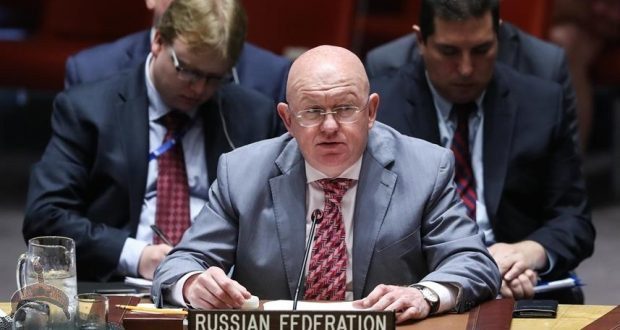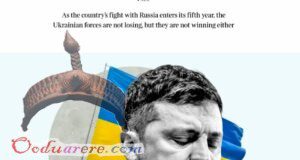15 September 2022
Ms. President,
We note the timeliness of today’s meeting. We thank Martin Griffiths, Maximo Torero and David Beasley for their opinions and assessments.
We remain extremely concerned with the situation of civilians in the context of the deterioration of food security against the backdrop of numerous armed conflicts. The root causes of any food crisis in any country have to be analyzed separately without hasty generalizations. Nevertheless, experts estimate that in two scores of States conflicts are now the leading cause of acute malnourishment. The UN Secretary-General recently warned of the risk of famine in five countries, four of which have been on the Security Council agenda for years.
Unfortunately, today the topic of food security is shamelessly used for manipulation in pursuit of geopolitical goals. Western countries continue to blame Russia for everything, including the food crisis, even admitting that it started before the special military operation in Ukraine. In the propaganda assault against Russia, any arguments that run counter to the Western goal are declared disinformation and propaganda, whereas the statements of our opponents are presented as facts. We should then look at the actual facts.
Back in May, at a Security Council meeting and in the media, United Nations representatives spoke about the importance of exporting grain through the Black Sea from Ukraine, which was called the world’s breadbasket. They noted that the Black Sea region accounts for up to 30 percent of the global wheat exports, without mentioning the fact that Russia’s share was about 25 percent. They stated that the main problem was high food prices, and that if the issue related to the ports in the Odessa region was not resolved millions of people would die, which meant “the poorest of the poor around the world, who are on the brink of starvation.”
Understanding the seriousness of the situation, Russia did not block the export of Ukrainian grain through the humanitarian corridor it had opened. The real reasons for the problems surrounding the export of this grain are demonstrated by the recent incident when a Romanian warship was blown up on a drifting Ukrainian mine near Constanta. Russia guaranteed that it would not use this situation for the purposes of the special military operation. Türkiye and the United Nations brokered the Istanbul agreements, designed as a package, which, I would like to highlight, was the idea of those who initiated them, and not Russia.
What do we have today? Even before the conclusion of the grain deal, wheat prices had fallen to their December 2021 levels. Then, the Black Sea Initiative allowed to export about 3 million tons of grain over the course of 2 months. The FAO Food Price Index has been declining for the fifth month in a row. Although it remains elevated, it should be noted that international food prices have been steadily growing since 2020, long before the escalation of the situation in Ukraine. Does that mean that the previously announced goal of bringing down the prices has been achieved? Judging by the United Nations statements, it hasn’t, because while the international prices have fallen, it didn’t lead been to lower national prices in the countries of the global South. What could be the explanation?
The geography of shipments undertaken within the Black Sea Initiative shows that almost half of all shipments go to high-income countries, while only 6 out of 136 vessels, that is 4 percent, with just over 250 thousand tons of cargo, went to the poorest countries with a food crisis. In comparison, 58 vessels, that is 42 percent, went to the EU countries, with a cargo of more than 1,2 million tons. Corn accounts for over half of all shipments. FAO estimated that a significant part of Ukrainian corn this season is non-food grade. Most of the food-grade wheat – millions of tons of it – was exported from Ukraine back in 2021. This even started a debate in the Ukrainian media about potential risks to the food security of this country. These statistics conform to the pattern of past shipments of Ukrainian corn to Europe, but do not fit in with statements about helping the hungry in sub-Saharan Africa, where other staple crops are consumed. Incidentally, in early September, we saw an article in The Guardian on the British projects to help Africans grow edible insects. Today, at one of the events, we heard that such projects are also supported by the World Bank, due to the high cost of fertilizers. It is unlikely that such a cynical approach will resolve the problem.
In response, we hear that part of the grain coming to Europe is re-exported to countries in need. As far as we know, this work is being done, as was previously, by our Turkish colleagues, who process the grain before re-exporting it. However, we have not yet heard about the re-export of grain by the EU countries, except from EU diplomats in New York. I wonder how re-export from Europe is carried out for those in need? Is it done on a commercial basis at market prices? In that regard, the day before yesterday, we unexpectedly learned from a statement by our United Nations colleagues that the original goal of the Black Sea Initiative was to restore commercial shipments from the region to traditional buyers. But how does this fit in with previous statements about helping the “poorest of the poor”? So far, only two ships were sent by the WFP to help those people, while a third one is being prepared. UN officials argue that supplies depend on donor contributions. We would like to ask the WFP Executive Director as to why the funds already available through its largest country programs are not spent for this purpose, for example, in Somalia, where, as we understand from the remarks of Martin Griffiths, there are very few chances to prevent the tragedy of famine.
According to UNCTAD, there is another explanation for such unaffordable food prices in developing countries: high inflation. Where did this high inflation come from? Once again, it is presented a consequence of the events in Ukraine. All the while, what is defiantly overlooked, is the impact of the ill-conceived Western monetary policy aimed at combatting the COVID-19 crisis when, against the backdrop of disruptions in supply chains, trillions of unsecured dollars, yen and euros poured into Western economies. Inflation, that was to be expected, spread to other countries. And now, Western central banks raising rates poses a new threat to heavily endebted developing countries.
Going back to the goal of resuming commercial supplies and the package Istanbul agreements. The latter, as you know, have the second part to them – a memorandum on facilitating the access of food and fertilizers from Russia to world markets. You can find it on the websites of the Russian Foreign Ministry and UNCTAD. We still face great difficulties in the implementation of this document, because our shipments are hindered by illegal unilateral sanctions. The argument the EU and the US keep repeating that their sanctions do not prevent the export of food and fertilizers is false. These restrictions complicate banking transactions, including for backbone banks of the Russian agricultural sector, whose accounts are simply closed. Freight insurance rates skyrocketed. As we understood from a recent UN briefing, they managed to significantly reduce such rates in relation to the grain from Ukraine, which cannot be said about Russian supplies. There are problems in cooperation with carriers. Our ships are denied access to European ports, which are important transshipment hubs for the normal functioning of supply chains. At the same time, the explanations given by the authorities of the sanctioning countries for businesses sometimes exacerbate the situation. For example, a FAQ memo with clarifications from the European Commission dated August 10 this year, in fact, prohibits European carriers from transporting Russian fertilizers to third countries – i.e. to Africa, Asia, Latin America, but allows deliveries to EU countries. Great help to poor countries. This selfishness, cynicism and hypocrisy of EU officials is especially indicative.
The situation with Russian fertilizers is alarming. As early as 2021, global prices for these products were reaching record levels, including as a result of market destabilization due to an ill-conceived policy of hastened energy transition and an anti-competitive struggle with Russian energy supplies. This year, with new sanctions and disruption of supply chains, things have gotten even worse. Personal sanctions were introduced against the management of private fertilizer companies from Russia. Their products are blocked by the authorities in a number of European ports. We are talking about almost 300 thousand tons worth tens of millions of USD. Our producers are ready to transfer these products to developing countries free of charge, nevertheless, they are simply not allowed to supply it.
It is important to realize the seriousness of this problem. According to the head of UNCTAD, if farmers do not receive fertilizers by October-November, there will be a significant decrease in their use. For example, in Africa – by about 20 percent. This will inevitably lead to a drop in the volume of the next harvest and threatens already with a physical shortage of food. Our business warns that if the interruptions in Russian fertilizer exports, which reach 40 million tons per year and help produce 100 million tons of crops, continue, another 500 million people in the world are at risk of starvation. I would like to ask our Western colleagues: is that your goal? Sanctions on Belarusian fertilizers exacerbate the situation. I would like to hear appropriate appeals to the leaders of Western countries from the leadership of UN agencies, such as WFP, at international meetings and in the media. We look forward to the involvement of the UN in these efforts.
Western sanctions undermine global food security in other ways. Due to interruptions in banking transactions, Russia has been unable to securely transfer its voluntary contributions to WFP for several months. We are talking about tens of millions of dollars that, among other things, would help countries facing the risk of famine. Similar is the situation with our contributions to UNIDO, which in the same way undermines the implementation of projects to support the food industry in states in need, including in Syria.
For its part, Russia is seeking opportunities to support global food security. Only in May-August this year, we managed to export 6.6 million tons of grain, of which 6.3 million tons were shipped to Asia, Africa and Latin America. In total, by the end of the year we expect to ship 30 million tons of grain and are ready to increase this volume to 50 million tons. Despite the obstacles, we were able to deliver 7 million tons of fertilizers abroad, including 3 million tons – to the countries of the global South. Access to the markets of vital products requires the implementation of the Russian part of the grain deal with a real return on it, otherwise the selective approach to the Istanbul agreements may be disastrous for them.
In conclusion, let us recall that in the context of Security Council Resolution 2417, relevant UN agencies and the Council should pay attention to other important country contexts as well. Thus, we would like to hear UN experts give a clear assessment of the situation in Syria, which previously not only provided itself with grain, but also exported millions of tons. Now this same country is losing food produced on the de facto US-occupied main grain regions in the northeast and is suffering the impacts of Western sanctions for its food security, as was noted in the recent FAO/WFP report “Hunger hotspots”. It is also important to think about the humanitarian consequences of the freezing of the foreign assets of Afghanistan, whose population is consequently driven to the extreme by the threat of famine, some people even consider selling their own organs and children.
We hope that all members of the Council and observers will refuse to use the fight against hunger in their geopolitical games and focus on real actions to prevent it.
Thank you for attention.
 Ọmọ Oòduà Naija Gist | News From Nigeria | Entertainment gist Nigeria|Networking|News.. Visit for Nigeria breaking news , Nigerian Movies , Naija music , Jobs In Nigeria , Naija News , Nollywood, Gist and more
Ọmọ Oòduà Naija Gist | News From Nigeria | Entertainment gist Nigeria|Networking|News.. Visit for Nigeria breaking news , Nigerian Movies , Naija music , Jobs In Nigeria , Naija News , Nollywood, Gist and more









